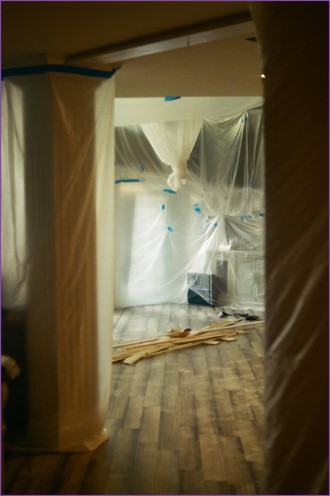Insurance and Renovating

01
Let your insurance company in on the fact that you’re planning to do a renovation soon.
Now that you got your newly renovated dream home. Your insurance coverage may need to be adjusted so that your coverage limits will be enough to include the new renovation. This could be important just in case something happens that damages or destroys your newly renovated dream home.
This way you and your insurance company can make a plan as to when and by how much to update your coverage.
Your building materials may not be covered
02
A standard homeowners policy may not cover building materials because it only covers the home once it has been built.
If you’re doing a major renovation, talk with your insurance company about whether or not you’ll need a renovation risk policy added to your existing coverage.

You may need extra liability insurance

03
Find out how you’re covered for liabilities. Make sure now before you start that if a contractor gets injured in your home or on your property you will be covered.
Also, you should consider what will happen if others not related to your renovation, like mail, delivery or even friends get hurt because of the construction.
Be sure to share these concerns with your insurance company. Make sure your insurance policy has you properly covered for any and all posable liabilities. Renovations increase the likelihood of accidents, and most standard homeowners’ insurance policies aren’t cut out to handle that level of liability.
Some policies won’t cover DIY renovators
04
Some insurance policies won’t cover DIY projects or insuring homeowners that take on renovations that require major skill sets and or license trades people.
It’s best to check with your insurance company first.
Finally, who is doing the renovation doesn’t change the fact you need to be properly insured before you start working.

Verify Contractors Insurance Coverage

05
Generally, your policy will not cover you against incomplete, defective workmanship, or financial loss if your contractor isn’t insured.
Always Verify Contractors Insurance Coverage Yourself by Calling Their Insurance Company. They will let you know if the policy is up to date and how much they have in liability insurance.
If you’re hiring a contractor, check that they’re both licensed and insured for liability and workers compensation.
DonePronto also recommends you check all subcontractors.
Vacancy can void your policy
06
Living through a renovation can be absolute hell. Its common for some to move out instead of living thought a renovation.
Some policies will become void if your home is unoccupied for any length of time.
Some policies can lapse after just 30 days. Avoid this by requesting a vacancy permit from your insurance company.

Take Pictures of Everything

07
Take before and after pictures of everything, including your belongings and the home itself. Its easily organize for you on DonePronto “My Home”.
DonePronto “My Home” is the first free and all in one digital platform for homeowners. It manages home improvement projects, home maintenance and home inventory.
“Looking after your home just got a lot easier”
With DonePronto “My Home” you can send your insurance company a complete PDF of your finished Renovation. This will inform them of all the changes you have made in order to stop any chance of a denied claim in the future.
Permits and Insurance Coverage
08
If you don’t have all of the necessary permits for any renovations your insurance policy could be void.
A building permit is necessary when you wish to construct, renovate, demolish or change the use of a building.
Building Code enforcement, including issuing building permits, is generally carried out by municipal building departments.

Renovate With The Intent To Sell

09
If you decide to sell your home, you’ll need to disclose any potential defects or construction projects to the buyer.
In many cases, the buyer may be able to sue you if they purchase a home with defects that weren’t disclosed.
To avoid problems, have your home inspected after a renovation and be honest and upfront with potential buyers about any construction work.